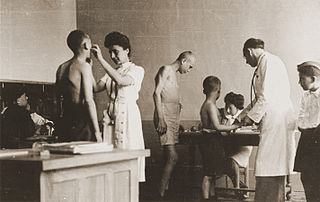
Bénédict Augustin Morel was a French psychiatrist born in Vienna, Austria. He was an influential figure in the field of degeneration theory during the mid-19th century.

Auguste Ambroise Tardieu was a French medical doctor and the pre-eminent forensic medical scientist of the mid-19th century.

Pierre Marie was a French neurologist and political journalist close to the SFIO.

Jean-Pierre Falret was a French psychiatrist. He was born and died in Marcilhac-sur-Célé.

Jacques-Joseph Grancher was a French pediatrician born in Felletin.

Charles-Paul Diday was a French physician born in Bourg-en-Bresse.

Marcel Lermoyez was a French otolaryngologist and surgeon who was a native of Cambrai.
Pierre-Hubert Nysten was a French physiologist and pediatrician who was a native of Liège.
Joseph Capuron was a French obstetrician.

Jacques François Édouard Hervieux was a French pediatrician and gynecologist born in Louviers.
André Berge was a French physician and psychoanalyst. He was born on 24 May 1902 in the 16th Arrondissement of Paris and died on the 27 October 1995 in Paris and he was a doctor, psychoanalyst and 'Man of Letters'.
Santé Diabète (SD) is a French non-governmental organization (NGOs) whose headquarters is in Grenoble (France) which is working on strengthening health systems to improve the prevention and management of diabetes in Africa. As part of a chronic disease like diabetes, improving the quality of care saves thousands of lives but also improves the quality of life for people living with diabetes.

Charles-Michel Billard was a French physician, best known for his research of pediatric diseases.
Albert Sézary was a French dermatologist and syphilogist.

Édouard Ernest Prillieux was a French botanist and agronomist known for his work with plant diseases.
Auguste Cuénod was a Swiss ophthalmologist, known for his work in the fight against trachoma.

Alphonse Leroy was a French medical doctor.

In 1557, a pandemic strain of influenza emerged in Asia, then spread to Africa, Europe, and eventually the Americas. This flu was highly infectious and presented with intense, occasionally lethal symptoms. Medical historians like Thomas Short, Lazare Rivière and Charles Creighton gathered descriptions of catarrhal fevers recognized as influenza by modern physicians attacking populations with the greatest intensity between 1557 and 1559. The 1557 flu saw governments, for possibly the first time, inviting physicians to instill bureaucratic organization into epidemic responses. It is also the first pandemic where influenza is pathologically linked to miscarriages, given its first English names, and is reliably recorded as having spread globally. Influenza caused higher burial rates, near-universal infection, and economic turmoil as it returned in repeated waves.

Françoise Brauner, born Fritzi Erna Riesel was an Austrian-born French pediatrician and child psychiatrist who was part of the medical contingent of International Brigades during the Spanish Civil War and was an Austrian Resistance member during Occupied France. She has devoted her medical career to educating refugee, displaced and maladjusted children, participating in the welcoming of Jewish child survivors of the Kristallnacht and of the Nazi concentration camps of Buchenwald and Auschwitz from 1939 to 1946 and working on autism in France since 1956. She also pioneered the analysis of children's drawings in war, creating from 1937 the first collection of drawing-testimonials to offer a unique perspective of the major conflicts of the 20th century through the eyes of children.

Émile Arthur Vallin was a French military physician, considered to be a precursor of public health in France a convinced Pasteurian.














